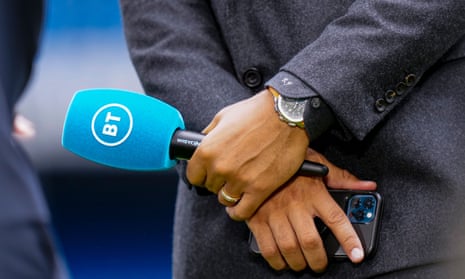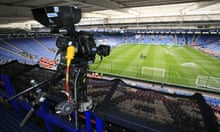BT has entered exclusive talks with the US pay-TV firm Discovery to create a joint venture business that will include BT Sport, which has rights to sports including the Premier League and Champions League.
The joint venture, which BT expects will be operational later this year subject to regulatory approval, ends almost a year of uncertainty over the future of the telecoms company’s decade-old pay-TV sport operation.
Discovery owns Eurosport, which broadcasts a wide range of sports including tennis and cycling and holds the pan-European rights to the Olympics.
The decision to combine with Discovery, which in the past has considered bidding for the UK TV rights to the Premier League, is a blow to the sports streaming business Dazn.
Backed by the billionaire Sir Leonard Blavatnik, Dazn, described as the “Netflix of sports”, pushed hard for a deal to buy BT Sport to fuel its plans to grow in the UK.
“The proposed joint venture with Discovery would create an exciting new sports broadcasting entity for the UK and would act as a perfect home for our BT Sport business,” said Marc Allera, the chief executive of BT’s consumer division. “With a shared ambition for growth, as well as the combination of our world-class sports assets along with Discovery’s premium sports and entertainment content, our customers will benefit from even more content in more places.”
BT, which has had to seek clearance from the Premier League and Champions League to push through the change in ownership, has also extended a reciprocal channel supply deal with Sky that is crucial to its sports broadcasting business until 2030.
The telecoms company has spent billions on sports rights to drive the growth of BT Sport since it was launched a decade ago to stem the loss of millions of broadband customers enticed by its rival Sky’s offers bundling internet connectivity with sport and entertainment programming.
The business succeeded in its job, although it only has a few million customers and turns just a small profit, and BT is now focused on its £15bn plans to roll out next-generation broadband and 5G mobile networks across the UK.
Dazn said its plans for the UK remained unfinished but the deal it had been discussing with BT Sport was not commercially viable.
“We remain fully committed to growing our business and investing in the UK, as you will see in the near future,” said Kevin Mayer, the chairman of Dazn. “On this occasion, however, the deal for BT Sport became uneconomical for Dazn. However, we respect that BT chose a different strategic path and wish BT, BT Sport and Discovery all the best for the future.”
Despite the positive news, BT’s shares fell by 4% in early trading, making it the biggest faller among FTSE 100 stocks, as the company warned of a drop in full-year revenues as a result of a delayed Covid-19 recovery and ongoing supply chain issues.
BT said it had revised its revenue forecast owing to a lag in expected performance in its global and enterprise operations, which focus on business-to-business customers, as companies struggle to get back on track.
The company said it was suffering from a slowdown in expected business from companies, as well as some supply issues relating to equipment it needs from its own suppliers.
“Everybody hoped this supply chain issue would resolve itself more quickly than it is,” said Philip Jansen, the BT chief executive. “We have managed it pretty well but in specific places, such as the large corporate area, it has been difficult to get hold of certain kit from our suppliers. They are short due to the global chip shortage and from a wider supply chain point of view. It will be fine but it does cause a little bit of softness (in revenues).”
Jansen was asked whether he thought his new largest shareholder, the activist investor Patrick Drahi, intended to increase his holding further. Drahi, who raised his stake from 12% to 18% in December, can raise his stake further but under UK regulations cannot mount any potential takeover bid until June.
“We have strong, big shareholders all of whom are 100% supportive of the direction of this business,” said Jansen. “[Drahi] hasn’t given any indication he wants to increase it further. He sees huge value in BT going forward.”







